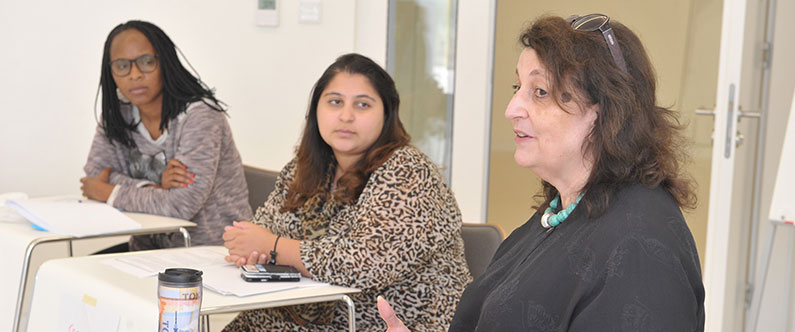QIIC initiative promotes intercultural communication in Education City
 The event was organised by eight Education City campuses.
The event was organised by eight Education City campuses.
Education city faculty and staff joined international scholars for a series of workshops and seminars exploring the opportunities and challenges presented by working in a culturally diverse society.
Eight Education City campuses invited six faculty members from the Intercultural Communication Institute (ICI) in Portland, Oregon for three days of discussions and presentations at Qatar Faculty for Islamic Studies (QFIS) building on subjects ranging from delivering healthcare across cultures to strategies for developing intercultural competence on college campuses.
Together the representatives of the campuses have formed an organization called Qatar Institute for Intercultural Communication (QIIC), which aims to raise awareness of intercultural communication across Education City, promote intercultural education activities, encourage a global exchange of knowledge and skills in the field of intercultural communications and establish collaborative intercultural scholarly efforts in Qatar and the wider region.
QIIC was co-sponsored by WCM-Q’s Global and Public Health Division, Virginia Commonwealth University in Qatar, Carnegie Mellon University in Qatar, Northwestern University in Qatar, Georgetown University in Qatar, Texas A&M University at Qatar, UCL Qatar and Hamad Bin Khalifa University.
The event featured a total of 12 seminars/workshops presented by six internationally renowned scholars from the Intercultural Communication Institute.
Dr. Janet Bennett, executive director of the Intercultural Communication Institute, said:
“There are multiple cultures and languages here at Education City and that creates an environment of incredible richness and diversity. In order for everyone to benefit from this great opportunity for intercultural exchange it is helpful to have the cultural competency to understand each other’s viewpoints and to respect each other’s opinions. By meeting to exchange ideas and learn from one another at events like this we are able to support our students to develop the cultural competence they need to engage successfully with one another and learn from one another, and to do so peacefully and happily.”
Dr. Nagesh Rao, director, MICA, has taught extensively in the field of intercultural communication. For QIIC, Dr. Rao led seminars at the event entitled Delivering Healthcare across Cultures and Foundations of Intercultural Communication. He said:
“Research has shown very clearly that when a diverse group is able to communicate effectively and work productively together, then the outcome is invariably more inventive, more creative and far richer. Culture is at the heart of creating healthy communities. Some of the best solutions and most interesting endeavors originate from the intersection between different cultures. If we can communicate with one another across cultures, we can create truly wonderful things together. I think that is tremendously worthwhile and inspiring.”
Valerie Jeremijenko, PhD, assistant dean of student affairs, Virginia Commonwealth University in Qatar, said:
“The QIIC committee came together to try to raise the level of intercultural competence across the campus. The most wonderful thing, though, is not only that we deal with a very important and relevant subject matter but that we have done it together. The members of the committee represent all of the different universities, plus HBKU, and we choose topics that we think will help all of our constituents and we always welcome new ideas.”
The aims of QIIC further chime with those of WCM-Q’s Center for Cultural Competence in Health Care (CCCHC), part of the Division of Global and Public Health.
Maha Elnashar, director of the Center for Cultural Competence in Health Care at WCM-Q, said:
“We are so happy to be a part of QIIC and to support the aims of the organization to promote intercultural communication. Our work on the Bridging the Gap program has shown us that promoting intercultural communication not only helps us to deliver healthcare more effectively by overcoming the language barrier, but also exposes us to new ideas and different ways of thinking that broaden our horizons.
Similarly, being part of QIIC joins us to a community of likeminded people and helps us share our ideas and learn from others at the same time.”
Kelly Anne Nelson, director of student affairs at WCM-Q, also participated in the event. She said:
“Intercultural competence allows us to learn more about other people, other cultures and other ways of thinking about the world. I think that’s one of the things that draw people to Doha – the opportunity to learn about and experience so many different cultures in one place.”
Huda Abdelrahim, senior specialist in cultural competence at WCM-Q, said:
“We were extremely encouraged by the positive atmosphere and enthusiasm there was for reaching out to one another across cultures in the seminars and workshops. We are very happy and inspired to be part of the diverse and culturally rich QIIC community.”
Damian Medina, director, Department of Student Affairs, Texas A&M University at Qatar, said:
"The Qatar Institute for Intercultural Communication continues to be a positive professional development opportunity for Texas A&M University at Qatar’s faculty and staff. The value which it represents is unmatched by being able to bring high impact professionals in the field directly to Education City. Participants were able to expand their intercultural knowledge, which they can immediately put to direct use and practice in their jobs.”
Dr. Ravinder Mamtani, associate dean for global and public health at WCM-Q, said:
“The wonderful cultural richness and diversity of our world is a tremendous asset, and it is vital that we have the skills, knowledge and open-mindedness to communicate with one another effectively and make use of that resource to further human development. The Division of Global and Public Health is happy to support and to be part of the QIIC and to have the chance to work proactively with our colleagues to enhance understanding of intercultural communication so that we might all benefit from the collective wisdom of humanity.”